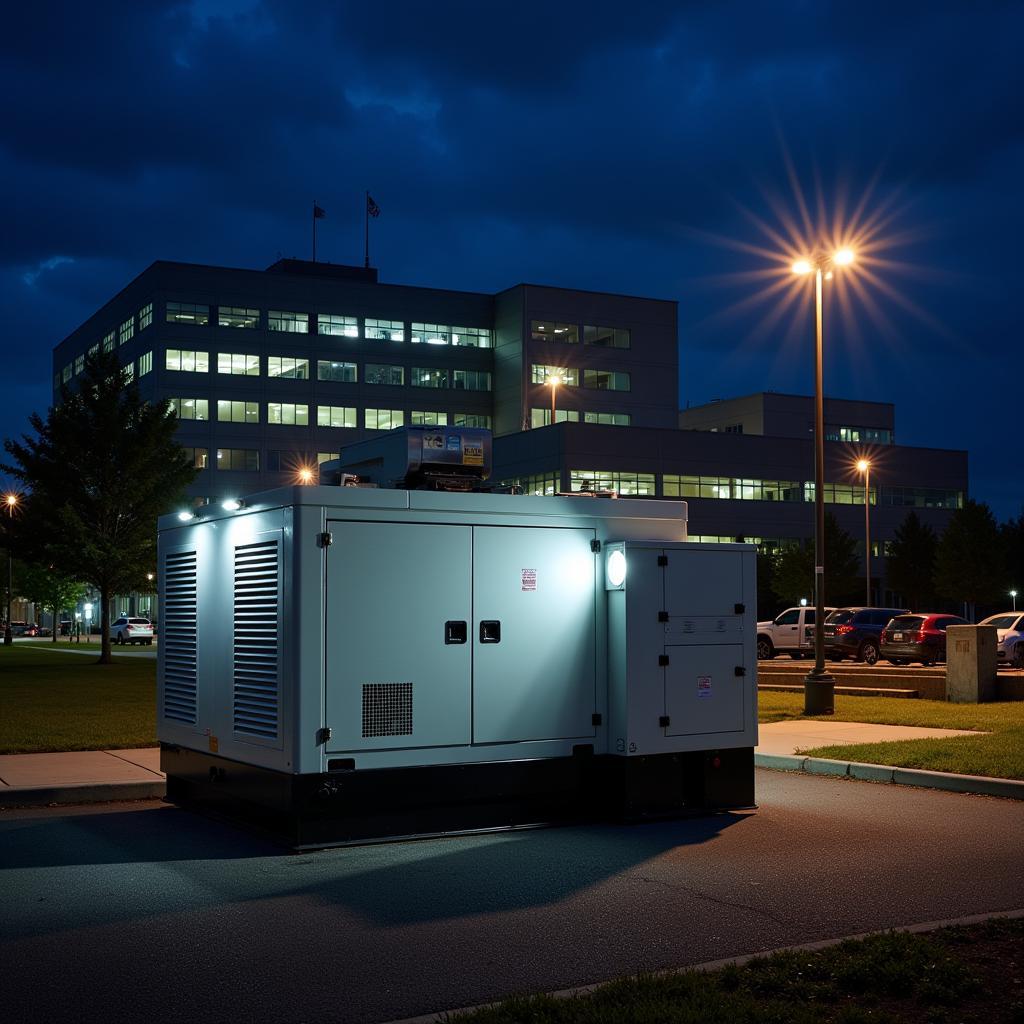A reliable power supply is paramount in a hospital setting. Lives depend on it. A backup generator for a hospital ensures that critical medical equipment continues to function during power outages, preventing life-threatening situations. This article will delve into the importance, types, and maintenance of backup generators, specifically tailored to the unique needs of hospitals.
 Hospital Backup Generator During Power Outage
Hospital Backup Generator During Power Outage
Why is a Backup Generator Crucial for Hospitals?
Hospitals require a constant power supply to operate life-saving equipment like ventilators, surgical instruments, and monitoring systems. A power outage can have devastating consequences, leading to treatment interruptions, equipment failure, and even loss of life. how many backup generators does a hospital have depends on its size and specific power requirements.
Life-Saving Equipment Dependence
Hospitals house various medical devices directly responsible for patient well-being. These devices, ranging from incubators in the NICU to dialysis machines, rely on a continuous power supply.
Maintaining Essential Services
Beyond medical equipment, hospitals need electricity for lighting, communication systems, and climate control. These services are essential for patient comfort and staff operations, especially during emergencies.
Types of Hospital Backup Generators
Choosing the right backup generator is crucial for a hospital’s emergency preparedness. Several factors influence this decision, including the hospital’s size, location, and budget.
Diesel Generators
Diesel generators are a common choice for hospitals due to their robust design and ability to provide substantial power output for extended periods.
Natural Gas Generators
Natural gas generators offer a cleaner fuel alternative to diesel and are often connected to the main gas line, ensuring a continuous fuel supply.
Bi-Fuel Generators
Bi-fuel generators offer flexibility by running on both diesel and natural gas. This dual-fuel capability ensures continuous power even if one fuel source is unavailable.
Key Features of a Hospital Backup Generator
A hospital backup generator is more than just a power source; it’s a lifeline. Therefore, it requires specific features designed for the critical environment it serves.
Automatic Transfer Switch
This feature ensures a seamless transition from the main power supply to the backup generator in the event of an outage, minimizing any disruption to critical operations.
Load Testing Capabilities
Regular load testing simulates a power outage to ensure the generator can handle the hospital’s full electrical load, verifying its reliability.
Remote Monitoring Systems
Modern generators often include remote monitoring systems that allow for real-time tracking of the generator’s performance, fuel levels, and any potential issues, enabling proactive maintenance.
“A well-maintained backup generator is a hospital’s best defense against the unpredictable nature of power outages,” says Dr. John Smith, Chief of Emergency Medicine at City General Hospital. “It’s not just a piece of equipment; it’s a critical component of our ability to deliver timely and effective care.”
Maintenance and Testing: Ensuring Reliability
Regular maintenance is paramount to ensuring the backup generator’s reliability. A well-structured maintenance plan reduces the risk of unexpected failures.
Routine Inspections
Regular visual inspections of the generator and its components help identify any potential issues early on, such as leaks, loose connections, or signs of wear and tear.
Fuel Management
Regular fuel checks and proper storage are vital. The fuel should be tested periodically for quality, and the storage tanks should be inspected for any contamination or leaks.
Load Bank Testing
Load bank testing simulates a real-life power outage, allowing the generator to run at full capacity and enabling technicians to identify any performance issues.
Conclusion
Investing in a hospital backup generator is non-negotiable for any healthcare facility. It’s an investment in patient safety and the continuity of critical care services. By understanding the importance of these generators and choosing the right type and maintenance plan, hospitals can ensure they’re prepared for any power outage situation.
If you are looking for more information on hospital infrastructure, you can find valuable resources on the best hospital in Delhi India or learn more about the significance of a red outlet in hospital.
For any inquiries regarding hospital equipment or medical infrastructure, contact us at Phone Number: 02437655121, Email: [email protected] or visit our address: No. 298 Cau Dien Street, Minh Khai, Bac Tu Liem, Hanoi, Vietnam. We have a 24/7 customer service team ready to assist you.